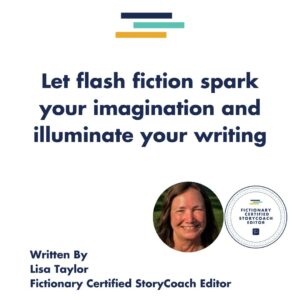
Brief, Plot, Twist – not the steps for a new dance craze or the latest challenge on social media – these are the three key elements of flash fiction.
Whether you refer to it as micro-fiction, nano-fiction, or a short short story, this exhilarating and challenging form offers opportunities to experiment with voice, style and structure.
Flash Fiction: Three Key Characteristics

Make It Brief
In a word, flash fiction is short.
While word count may vary depending on the source you are reading or the submission guidelines of the publication, this type of fiction is usually capped at 1000 words – with some people upping the count in this very tiny story genre up to 1500 words.
What is the minimum number? How low can you go?
Let’s look at a couple of famous examples to get a sense of how short you could make a story.
Although not written by Hemingway, as some may think, this six word story has captured hearts and shown the power of flash fiction since the early 1900s.
For sale: baby shoes, never worn.
This has led some writers to take on the six word story.
Another famous and very short story, by Joyce Carol Oates, is Widow’s First Year.
I kept myself alive.
With only four words, this is a truly short story! Even with the title, which adds depth to our understanding, the story is only seven words!
There are even subcategories of flash fiction that have different word counts. Twitterature is 280 characters or less based on the restrictions of a Twitter post. Drabble is usually exactly 100 words. 55 Fiction is, as you may guess from the name, 55 words or less.
Plot
Flash fiction is still fiction.
The reader expects a story: beginning, middle and end. More than that, a reader wants a character facing a challenge or obstacle, reaching a resolution and, ideally, emerging changed in some way.
Twist
The best flash fiction surprises us.
While it doesn’t have to be a plot twist, an astonishing final line or an unexpected ending, the Twist characteristic challenges the readers to think deeply about the true meaning of the story.
These characteristics act as limits that confine your writing but release your creativity. Great micro-fiction can resonate with universal truth and touch a wide audience.
That may be why nano-fiction authors include Franz Kafka, Joyce Carol Oates, Jamaica Kincaid, Zora Neale Hurston and Yasunair Kawabata – to name just a few.
Tips for Writing Flash Fiction

Tight Prose
- Every word counts
- Strong imagery, powerful verbs and an active voice make every word work for your story
- Play with literary devices, descriptive verbs and all the senses to immerse the reader
Create Limits
- One or two characters will help focus your story
- Keep to one moment and one scene
- Remove backstory and trust your readers to fill it in
- These self-imposed limits will help keep you within the low word count
Try First Person
- First person point of view creates an instant connection for your reader
- Fewer words needed
- Explore character voice and viewpoint
Strong Story Elements
- Hook your reader immediately
- Consider starting mid-action and let the reader jump in with you
- Think about a strong middle twist
- Satisfy your reader with a resolution
Surprise Your Reader
- Play with plot twists, surprise endings and changes in tone
- Shifts create movement in your narrative; consider how to make your story move
- Readers are entranced by the magic of the unexpected. Flash fiction lets you focus on the reader’s experience
- While it isn’t necessary, nano-fiction can provide a new way of looking at the world or at least at the story
Why Write Flash Fiction?

What’s in it for you? Flash fiction offers a genre to explore and experiment with your writing.
Play With…
- plot twists
- sensory detail
- literary devices
- character development
- use of objects to strengthen your scene
- use of weather/setting connecting to your story goal
Hone Your Craft
- external scene/story goal for POV character
- clear shift at scene/story middle
- unanticipated scene/story climax
- entry and exit hooks
- integrating internal and external POV goals for character and story depth
Have Fun!
- take on the six word challenge
- tackle writer’s block by writing flash fiction
- publish?
Want to Publish Your Flash Fiction?
A quick web search will produce a range of publications that accept flash fiction. Look for the publications that suit your style and content. The following publications even have flash fiction in the name!
In FlashFictionOnline, you will find a wide range of voices and styles to read. The online magazine requires submissions of 500 – 1000 words with a complete story. Flash Fiction Magazine is looking for stories between 300 – 1000 words. As always, take time to read the submission guidelines before sending your work. Both publications focus on fiction. For a look at the difference between fiction and non-fiction, check out this article by Heather Wood.
Flash Fiction Awaits!

Inspired?
Want to hone your craft?
Want to have some fun?
Flash fiction awaits!
Whether you dig into your pile of notes, unused scenes and vague ideas or head to a list of writing prompts offered in books or online, try flash fiction.
Give yourself an hour or less to write. Play with ideas. The first attempt may not be a masterpiece, but it may. The least it will do is lead you into a playground of potential. The most it may do is give you a great flash fiction story or the idea for your next novel.
Let flash fiction spark your imagination and illuminate your writing.
Article Written by Lisa Taylor

Stories are powerful. Through my experience as an educator and librarian, I’ve explored how stories work and supported writers in finding their voices and honing their craft.
As a Fictionary Certified StoryCoach Editor, I offer a thorough, objective structural story edit that honours your voice, recognises and celebrates your skill, and offers clear, actionable ideas on ways to make your story shine even more. You can reach me through the Fictionary Online Community.
Want to tell stories guaranteed to delight readers?
Sign-up for you 14 day free trial of StoryTeller today!


